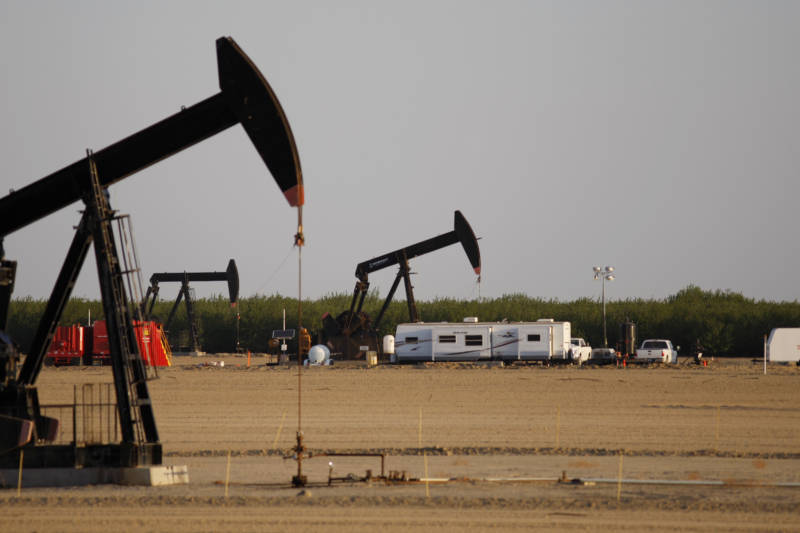While carbon dioxide is the main greenhouse gas driving climate change, methane gas is 84 times more potent in terms of global warming over the first 20 years it is released.
“Even if you don’t believe in climate change, this is a bad idea,” said Rob Jackson, chair of the Earth System Science Department at Stanford.
Jackson called the proposal “irresponsible” and added that it undercuts companies that make money by selling captured gas for fuel.
“There are many reasons for cutting methane emissions beyond climate,” he said. “When we cut leaks, we save lives and improve human health.”
Often, toxics like cancer-causing benzene are released along with the methane, Jackson said.
Environmental groups said the EPA’s plan is meant to restrict the agency’s overall legal authority to regulate the gas in the fight against global warming.
EPA Administrator Andrew Wheeler said the proposed rule followed President Donald Trump’s directions to remove “unnecessary and duplicative regulatory burdens from the oil and gas industry.”
California’s Methane Rules
In 2017, the California Air Resources Board passed strong regulations that require oil and natural gas producers to reduce methane leaks.
Private interests own the vast majority of California’s large oil fields. Because the EPA proposal only applies to federal land, if adopted, the changes will not affect these places.
Jackson expressed concern that the rollbacks could apply to the oil fields that are on land managed by the Bureau of Land Management and the Forest Service. They account for about 10% of the state’s total oil and gas production.
But a spokesperson for the board said in an email that California’s methane rules apply to federal land, too.
California is one of the largest importers of oil and gas in the U.S. The state imports about half of its oil and close to 90% of its natural gas, said Los Angeles-based Tim O’Connor, senior director of the Environmental Defense Fund’s energy program.
“Whether it’s gas being imported from Texas and the Permian Basin or from the Four Corners region, that fuel will be much dirtier and more impactful to the climate,” he said.
O’Connor said the rollbacks could push California completely away from natural gas.
“This will continue California’s march toward the end of natural gas,” he said.
Federal Environmental Deregulation
The step would be the latest in a series easing the previous administration’s emissions controls on the oil, gas and coal industries, including a 2016 rule regulating oil-industry methane leaks as a pollutant under the federal Clean Air Act.
Under Trump, both the Interior Department and the EPA have proposed a series of rules — some blocked by courts — to loosen regulations of methane emissions.
Environmental advocates and former EPA officials had said they expected the new methane plan to go further than previous proposals, with a goal of exempting companies from requirements to detect and stop methane leaks at existing oil and gas sites.
“Essentially, this is the umpteenth iteration of the EPA’s exercise to define away its Clean Air Act authority … to address air pollution and greenhouse gases,” said Joseph Goffman, an EPA air official under President Barack Obama.
The oil and gas industry is the country’s primary source of methane emissions, according to the EPA, accounting for nearly one-third in 2016.
While environmental groups pointed to the long-term impact, the oil industry said the direct immediate effect on methane emissions would be negligible. Controls on other, regulated pollutants would also capture methane in the pipeline, said Erik Milito of the American Petroleum Institute.
The Obama-era methane limits imposed “a disproportionate effect on small businesses” in the oil industry, Milito said. “A lot of mom and pops would have their wells shut in, elderly people with wells on their properties that could be shut down.”
The rollbacks on emissions from oilfields, storage sites and pipelines have split the oil industry, worrying some in the industry about growing blowback in a world increasingly mindful of climate change.
Royal Dutch Shell this year urged the administration to crack down — not ease up — on the emissions. Many others in the oil and industry have welcomed the easing, however.
The latest rollback “highlights the Trump administration’s complete contempt for our climate,” Kassie Siegel of the Center for Biological Diversity, an environmental group, said in a statement. “The EPA is now so determined to actually increase greenhouse pollution that it’s even shrugging off concerns from oil and gas companies about gutting these protections.”
Ellen Knickmeyer from the Associated Press contributed to this report.
